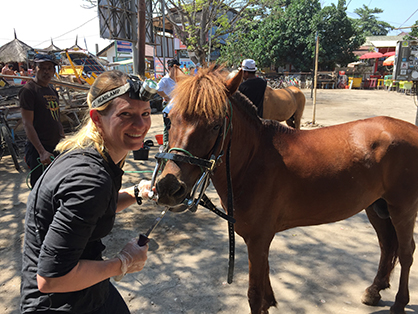Aussie Vet Travels to Indonesia to Help Working Ponies
 Member of Equine Veterinarians Australia, Dr Kirsten Jackson, became a vet to help animals and prevent suffering.
Member of Equine Veterinarians Australia, Dr Kirsten Jackson, became a vet to help animals and prevent suffering.
Last month, Dr Jackson returned from volunteering in Indonesia, along with her team of four, where they spent nine days treating more than 200 working ponies, many of which were malnourished, overworked and seriously wounded.
“I first travelled to the Gili Islands in 2014 where I assisted with worming and treating infections which helped in the short-term, but I didn’t feel like I’d done enough to improve the longer-term welfare of the ponies. Putting betadine on a wound seemed pointless when they put the same horrible equipment straight back on the pony,” Dr Jackson said.
Dr Jackson returned to Australia and started seeking donations for much-needed equipment including bits, boots, bridles, harness pads, medications, wormers, betadine and wound ointments.
“I returned to Gili Trawangan last month with my assistant and three vet students. We took six suitcases filled with donated equipment and the team worked tirelessly performing dental examinations and treatments, worming, wound management and providing multivitamin injections. I treated more of the medical cases including eye and skin infections, heat stress, systematic infections and many cases of diarrhoea caused by a lack of fresh water and poor diet.
“The second trip was a lot more rewarding as we felt like we were making a real difference. We removed the offending gear of wires, pipes and nails and replaced it with proper equipment while treating longer-term issues such as dental disease,” she said.
According to Dr Jackson, the ponies in the worst condition were those used to cart rubbish around the island, up to 22 tons daily between nine ponies. They were skinny, lethargic and suffering from severe lacerations caused by nails that were used to hold their harnesses together.
“We completely replaced the three worst harnesses with donated ones and educated the drivers about not using nails to repair breaks in the leather.
“There was one pony in particular, ‘Oscar’, that we all lost sleep over. He was skin and bone, could barely walk and I believe was on the verge of collapse. He also had the worst wounds from the nail ridden harness. Fortunately we were able to have him moved to another property. It’s great to hear that he’s put on weight and is doing well,” she said.
Dr Jackson has returned to her practice in Perth and is now in the process of enrolling in a Masters degree to continue her research into an equine dental condition known as peripheral dental caries.
“I love everything about my job. I get to spend my days improving animal welfare, treating often hidden pain and suffering. It’s why I became a vet,” she said.
Dr Jackson hopes to raise funds for a third trip to the Gili Islands so she can conduct another free clinic next year.
For further information on the program, contact Kirsten via Kirsten@DentalVet.com.au or http://www.facebook.com/dentalvet/










